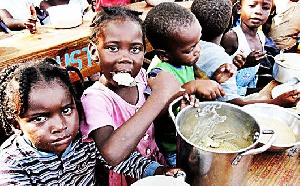Ghana is losing GH¢4.6 billion annually as a result of child malnutrition which affects their health and education, a study by the National Development Planning Commission has revealed.
The study found that positioning nutrition interventions as a top priority for poverty reduction and broad-based development was often difficult because of lack of data on the short and long term returns.
Dr. Esther Ofei-Aboagye, the Vice-Chairperson of the National Development Planning Commission, launched the report of the study in Accra, dubbed: “The Cost of Hunger in Africa: ‘The case of Ghana.’ It was supported by the Economic Commission for Africa, the African Union Commission and the World Food Programme.
The report was to assist member states in establishing the social and economic impact of under-nutrition on children for national development.
The study was to estimate in a given year the additional cases of morbidity, mortality, school repetition, drop-out rates and reduced physical capacity associated with person’s under-nutrition status before age five.
The report said for children, especially from poor households, undernourishment had adverse implications for their school and for workers, it reduced productivity, earnings, and household welfare. Stunting (low height for age) is as a result of children missing out on critical nutrients including proteins, vitamins, and minerals while in the womb and in the first two years of life.
The report revealed that 37 per cent of the adult population of the country suffered from stunting as children, 24 per cent of all child mortality cases are associated with under nutrition and child mortality associated with undernutrition has reduced workforce by 7.3 per cent.
The report recommended the establishment of a multi-sectorial policy approach for a concerted fight against malnutrition while improving the coordination of interventions. Dr. Margaret Agama Nyetei, in charge of Health, Population and Nutrition at the Social Affairs Department of the African Union, said the issues concerning malnutrition very critical to the union and therefore incorporated into its plan for the next 50 years known as ‘Agenda 2063’.
“We believe that the realization of Agenda 2063 and the achievement of the Sustainable Development Goals (SDGs) will not be possible without fully harnessing the potential of all sectors of the population including children”.
Mr. Thomas Yanga, the Director of the World Food Programme, Africa Office, said the goal of eliminating stunting was key to achieving zero hunger and the SDG-2, adding that the losses to the economy could be averted through strategic interventions for adequate nutrition for mothers and young children.
Prof. Takyiwaa Manuh, the Director of the Social Development Policy Division at the Economic Commission for Africa, said ensuring a generation free from malnutrition required investments in the nutrition strategies and interventions.
She urged the country to forge strategic partnerships with stakeholders especially in the private sector and non-state actors to combat under nutrition holistically.
General News of Sunday, 7 August 2016
Source: GNA
Ghana loses GH¢4.6bn on child malnutrition - NDPC
Entertainment












